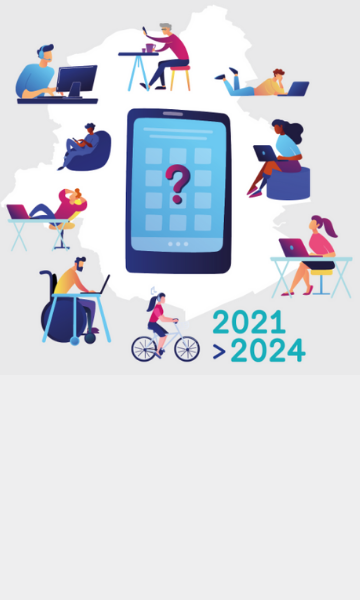Allowing ALL Brussels residents to get to grips with digital technology and enjoy all the opportunities it offers, in terms of employment, education, purchasing power, social links and freedom! This is the major challenge that the Brussels Region is committed to tackling between now and 2024 through its digital appropriation plan. Bernard Clerfayt, Brussels Minister in charge of Digital Transition and Administrative Simplification, presented a plan to the press on Friday.
As of today, the Region is taking action to help all those who feel remote from the virtual world, so that they can discover the benefits of digital technology, have a network of stakeholders ready to help them, have access to up-to-date equipment and be supported in accordance with their needs. Urgent action is needed, as currently 28% of Belgians aged 65-74 have never used the Internet and 51% of people on low incomes in Belgium have low digital skills.
The four areas of this plan - raising awareness, uniting, equipping, and supporting -, whose implementation over the next four years will be overseen by the BRIC's Inclusion Unit, should make it possible to roll out a 360° strategy that places users' expectations at the heart of 66 concrete actions.
The plan has also been designed to include a range of stakeholders, whether associations, private or public companies, in this broad strategy. They are warmly invited to read the plan and contact the BRIC Inclusion Unit if they feel they have a role to play in promoting digital appropriation.
"Thanks to its experience on similar inclusion projects (such as wifi.brussels, the Multimedia Plan in schools or the creation of municipal DPSs), since December 2019, the BRIC has led initiatives carried out within the Brussels Region, through its Digital Inclusion Coordination," explains Marc Van den Bossche, Deputy Director-General of the BRIC.
This mobilisation of resources will make it possible to create inclusive recommendations, in collaboration with easy.brussels, to make digital public services accessible to all. This action will involve analysing the accessibility of digital public services and developing a package for IT developers so that digital public services are considered in an "inclusive" way from the inception of a project. It will also allow the setting up of a barometer and studies to obtain precise figures on the state of the digital divide and the level of skills of Brussels inhabitants at the present time. Finally, a special effort will be made to create a code of ethics for multimedia facilitators and digital public writers in order to regulate the profession and guarantee the safety of users' personal data and the overall communication of these various actions.
There are 66 measures in total (
in FR /
in NL) which, starting today, will build a high-performance and humane digital society in Brussels.
